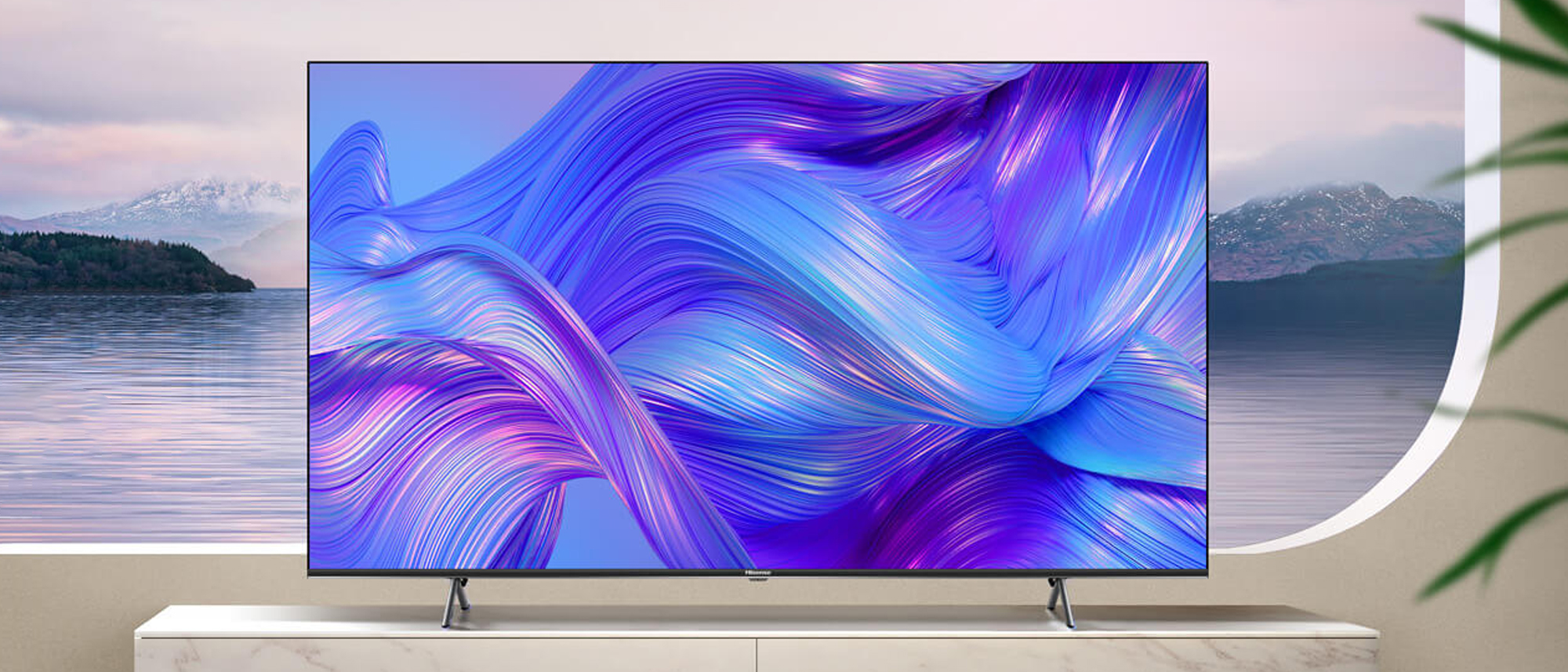Tom's Guide Verdict
For a TV that costs less than $500, the Hisense U6H has a surprising amount of power and picture potential. It delivers good brightness in our testing, low input lag for gaming and the intuitive Google TV interface. Just don’t expect good sound or HDMI 2.1 ports.
Pros
- +
Extraordinary value
- +
Good brightness for its category
- +
Low input lag
- +
Uses Google TV
Cons
- -
No HDMI 2.1 ports
- -
Poor audio
Why you can trust Tom's Guide
Price: $429.99
Screen size: 55-inch
Model: 55U6H
Resolution: 3,840x2,160
HDR: HDR10, HDR10+, Dolby Vision, HLG
Refresh Rate: 60Hz
Ports: 4 HDMI 2.0, 2 USB
Audio: 20W
Smart TV Software: Google TV
Size (without stand): 48.4x28.1x3 inches
Weight (without stand): 30.6 lbs.
The Hisense U6H is the entry-level offering in Hisense’s ULED series of TVs, utilizing local dimming on its backlit LCD to boost brightness and quantum dots to kick up the color. Hisense’s gamble is that the combination of these features, plus its suite of ULED picture-enhancement technologies, will allow this set to deliver more than you’d expect to see for less than you’d expect to pay — and it’s one that generally pays off.
For a TV that costs as little as this one does, its brightness and color are above-average, and it has appealingly low input lag for gamers. There are trade-offs to be made here, however: there are no HDMI 2.1 ports and iffy contrast means that the brightness isn’t always put to the best possible use.
As you’ll see in my full Hisense U6H review and in our test results, this 4K TV isn’t for everyone, but it may be one of the best TVs a budget-conscious shopper can buy.
Hisense U6H TV review: Pricing and availability
When it comes to pricing, all four of the sets in Hisense’s U6H line are pretty remarkable. The quartet includes:
- Hisense 50U6H: $399.99
- Hisense 55U6H: $429
- Hisense 65U6H: $599.99
- Hisense 75U6H: $749.99
We tested the 55-inch U6H, and expect performance to be similar for both the 50- and 65-inch models. The 75-inch version, which has a different display panel and a modified speaker setup, is unlikely to look or sound quite the same, though it has the same suite of features as the smaller U6H sets.
Hisense U6H TV review: Design
The U6H’s physical design is not especially distinguished. Its screen is framed by a thin plastic bezel that’s a trifle narrower on the top and bottom than on the sides, hovering around one-eighth-inch in either case. The bottom edge is augmented by a one-third-inch strip bearing the Hisense logo. Beneath that is a box for the activity light and a dual-purpose Power and Input button, plus a physical switch for turning on or off the integrated far-field microphone.
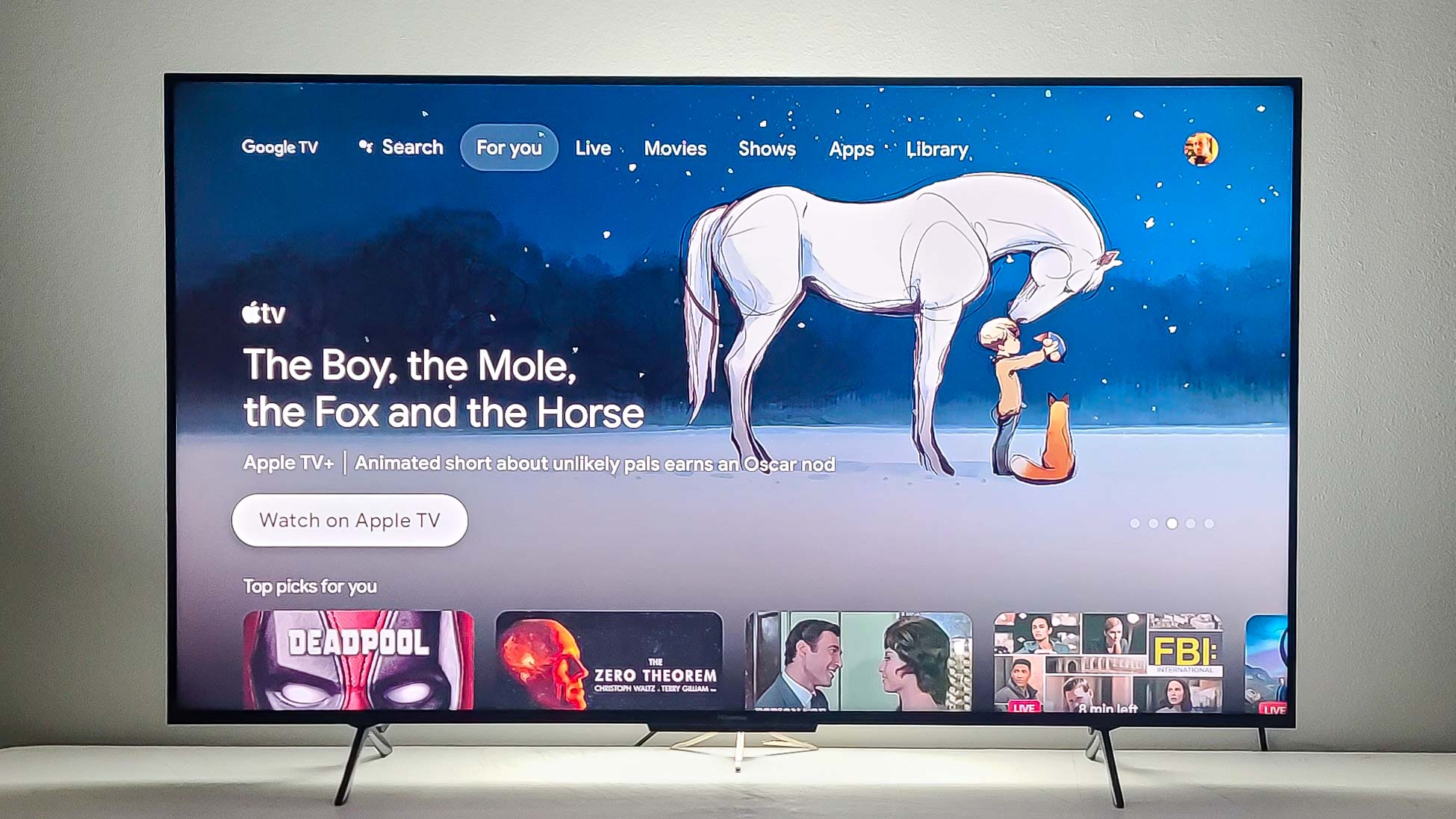
As may be evident from the set’s dimensions (48.4 x 28.1 x 3 inches), the 55-inch U6H is on the thick side, with most of the extra depth at the bottom of the rear panel, where the control box is located. This has an attractive check pattern on it that, aside from the raised ridge about 7.5 inches from the top of the screen, marks the only design highlights of the rear panel. There are also four VESA holes for mounting on the wall, these being in the 300x200mm configuration.
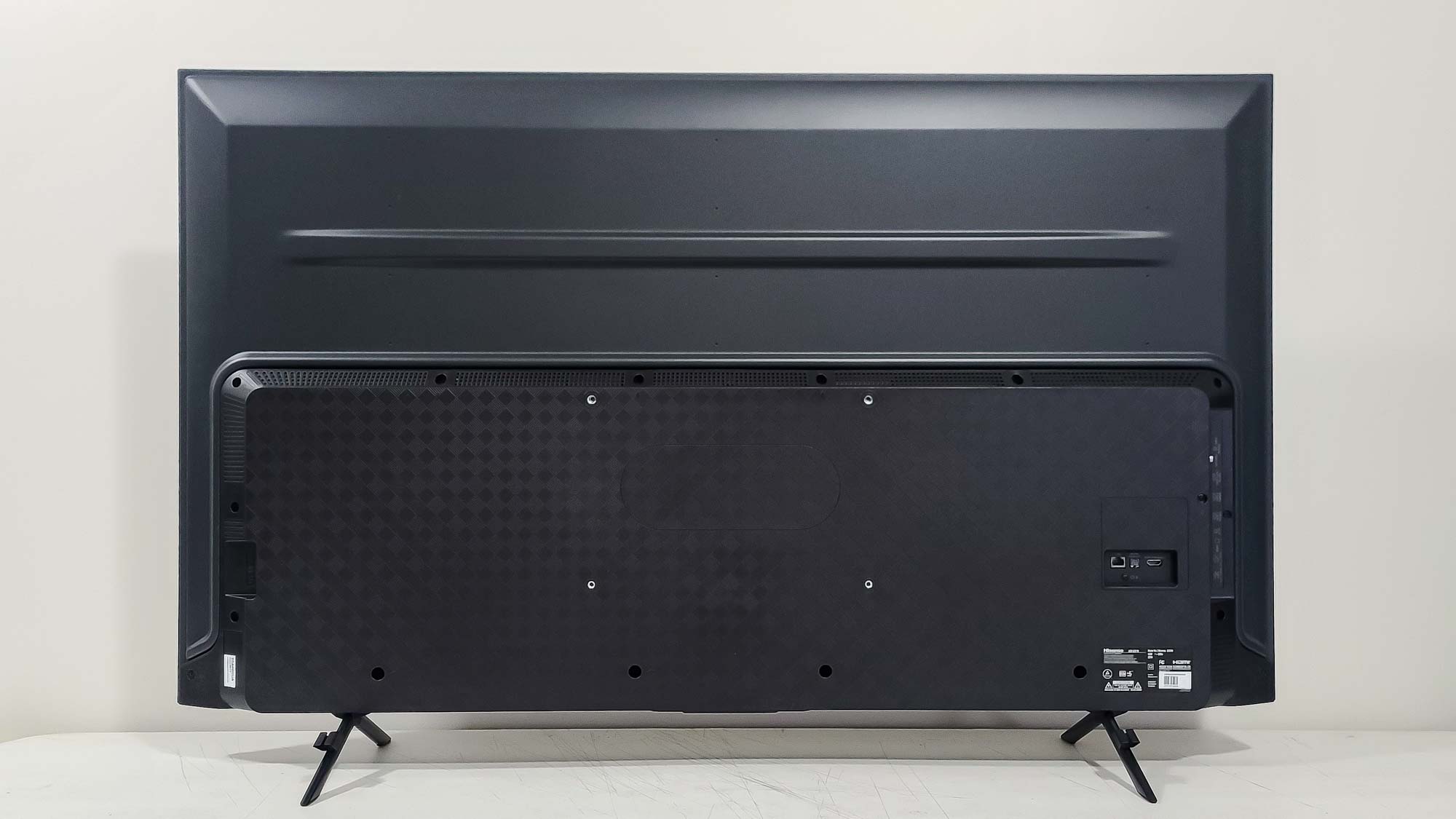
The stand consists of two feet that attach (via two screws each) to sockets located a little over 7 inches from the set’s lower corners; you don’t have multiple placement options the way you do on, say, the Hisense U7H.
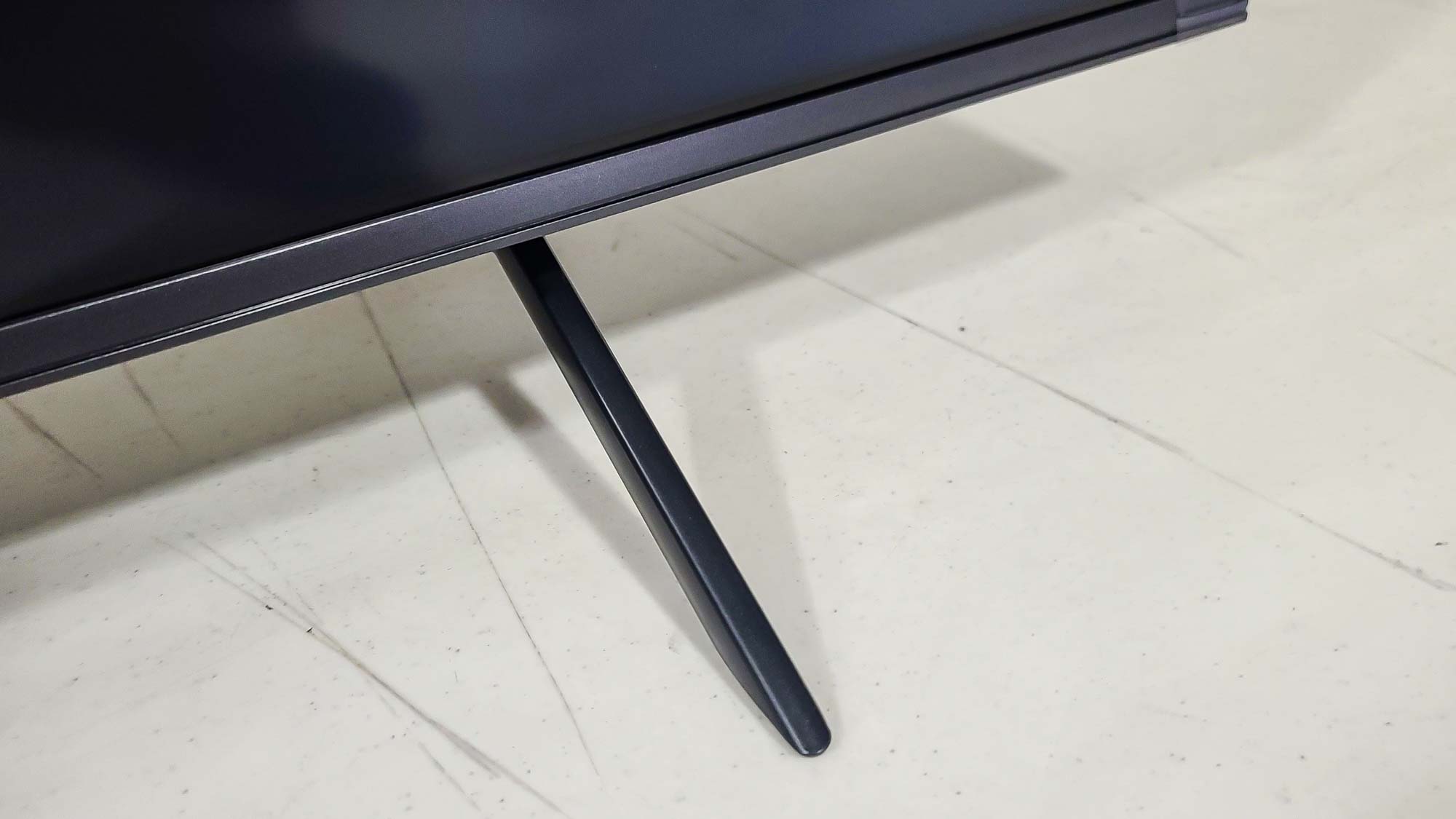
Like the rest of the TV, the feet are unremarkable save one nice feature: built-in brackets on the back to help you better manage your cables.
Hisense U6H TV review: Ports
The power cable for the Hisense U6H connects to the right side of the rear panel, facing straight out the side. The ports on the left side are split. The Ethernet port, the S/PDIF optical audio out jack, and one HDMI port face straight back; all the other ports angle directly out the left side. These include Serial and Service jacks, the coaxial cable connector, three more HDMI ports, AV in, a headphone jack, a reset button, and two USB ports, and they’re all easy to access.
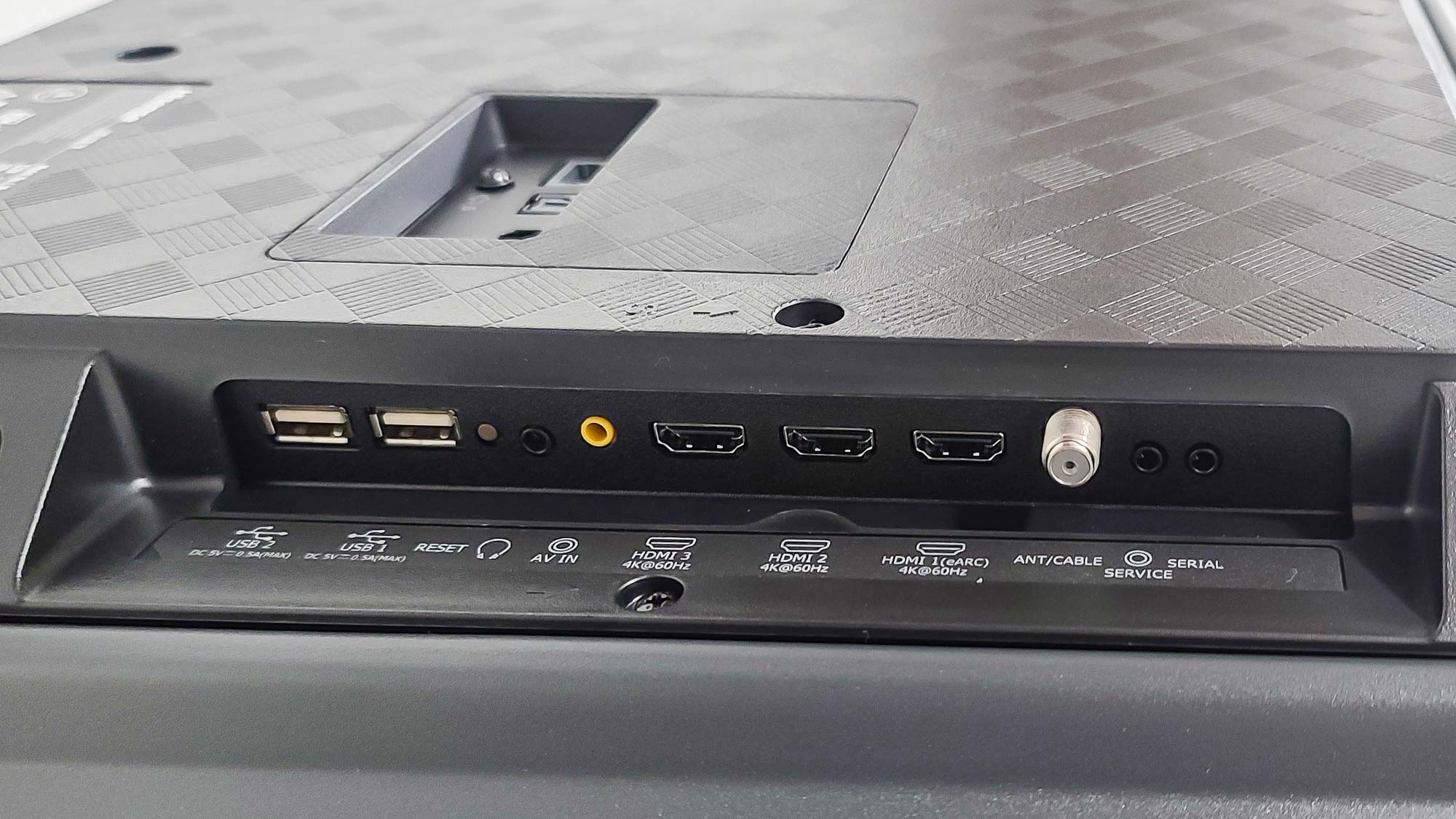
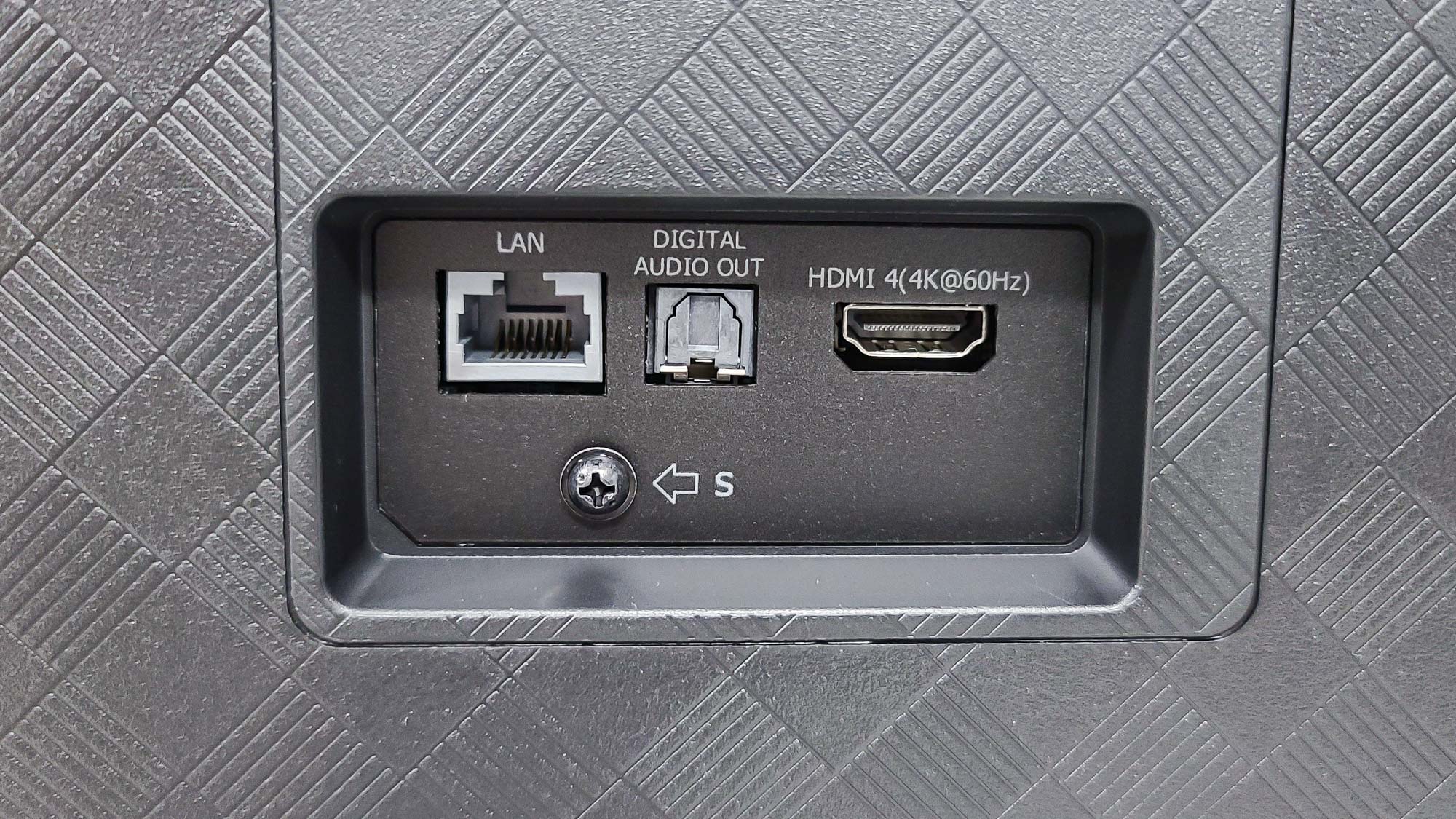
Although one of the HDMI ports is equipped with eARC, all four are restricted to 60Hz — none support the newer, higher-bandwidth HDMI 2.1 standard, which can give you enough bandwidth to watch 4K video at 120Hz and take advantage of more advanced capabilities. Some budget TVs do come with at least some of these, so it’s a shame to see none here. That limits the U6H’s utility for gaming (see below) and watching fast-movement content like sports.
Hisense U6H TV review: Performance
What was immediately most obvious on the U6H was how it handled brightness — in ways both good and bad. In movies like Denis Villeneuve’s Dune and The Batman, where the interplay between dark and light picture elements is critical to the overall effect, it routinely nailed half of the equation. You could all but feel the searing sun of the desert planet Arrakis in the former and the piercing streetlamps and spotlights of crime-choked Gotham City in the latter. But the lack of deeper blacks gave Dune a washed-out effect and robbed The Batman of much of its shadowy intensity. Watching neither movie was exactly thrilling.
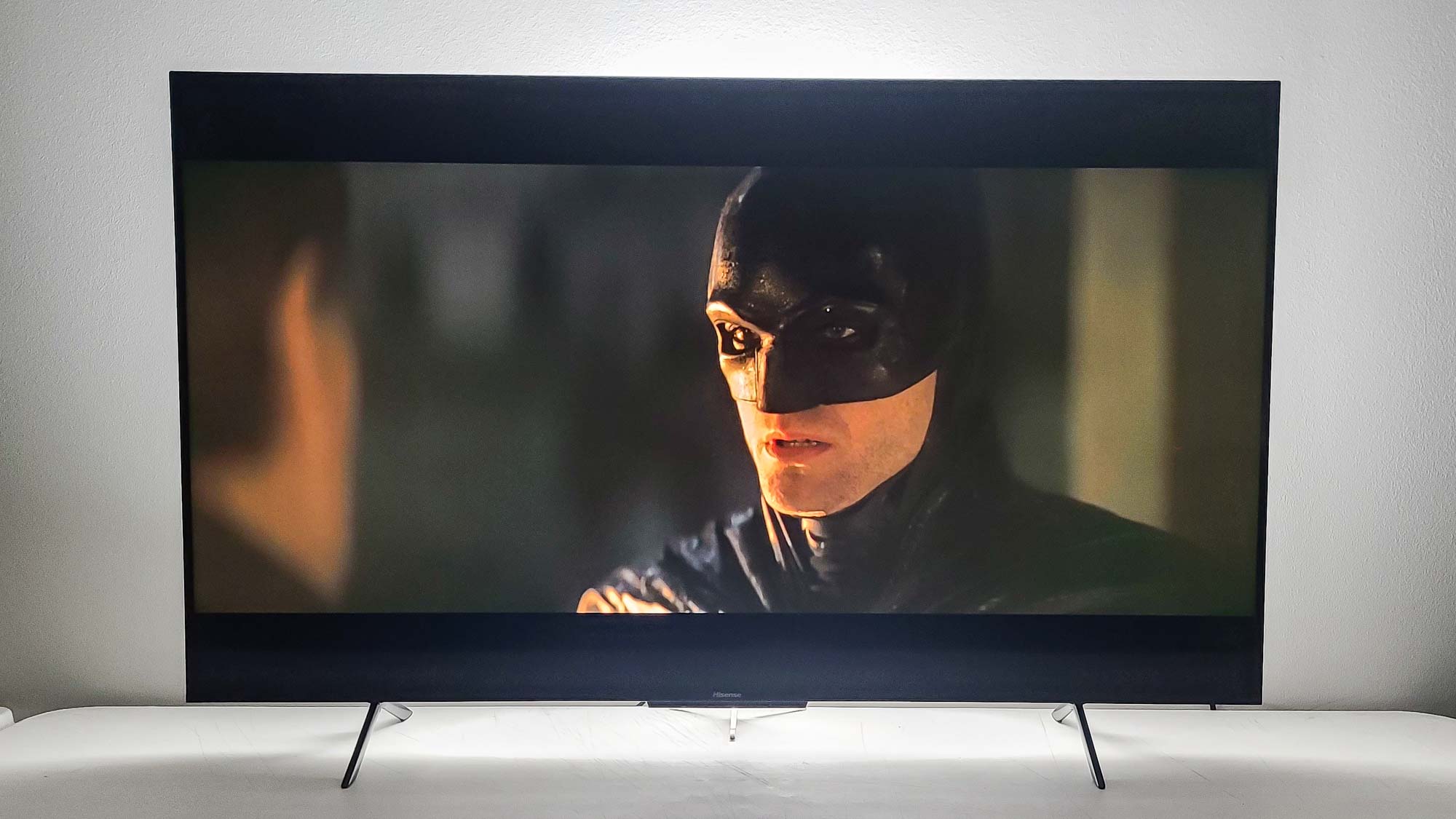
But Spider-Man: No Way Home, which mixes comic-book-flamboyant colors with electrifying jolts of light, popped more readily off the screen. So did Disney’s animated Encanto, which thrives in the tropical greens, pinks, and violets of its Colombian setting that looked vivid and enticing.
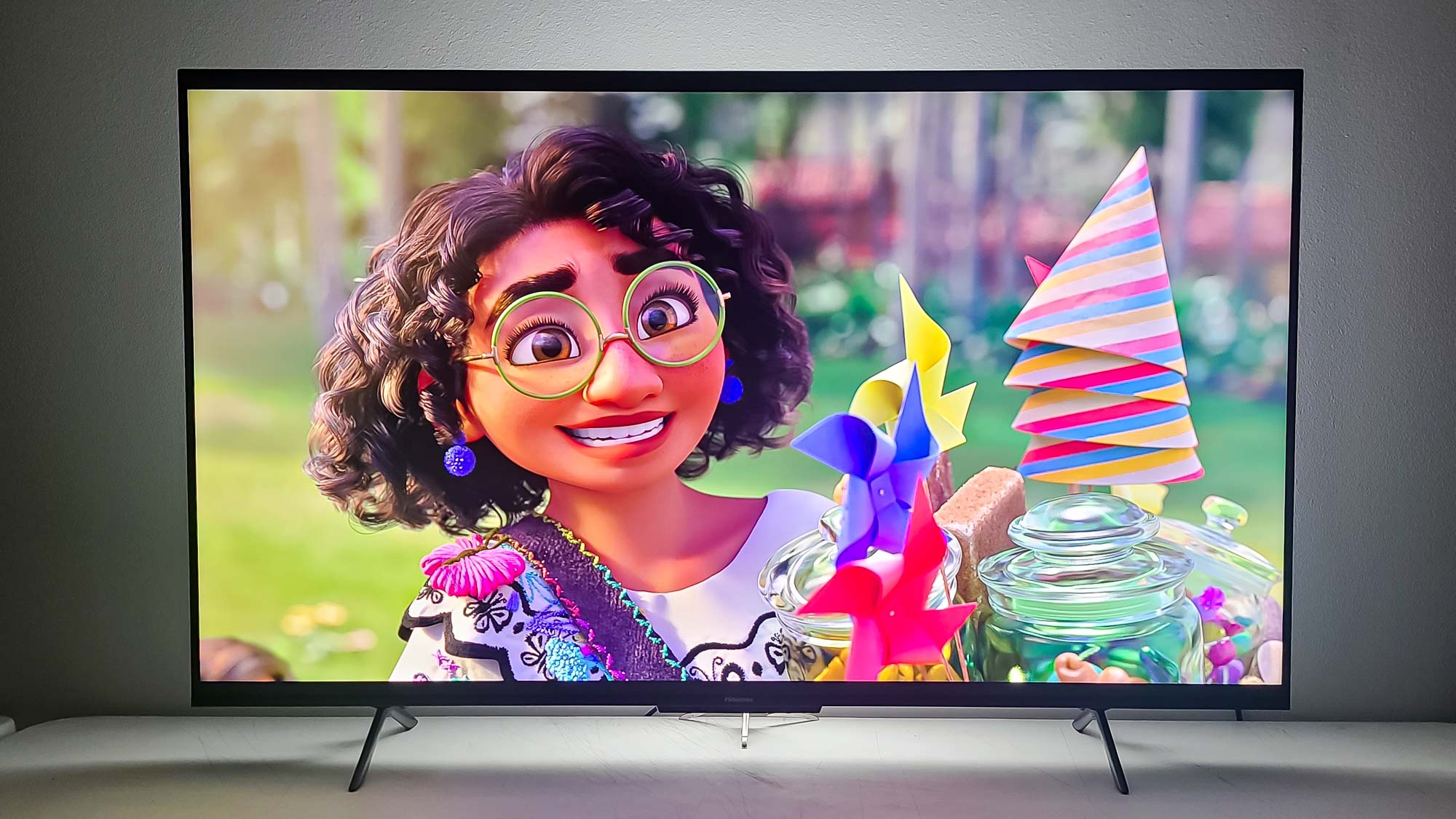
Perhaps predictably, Top Gun: Maverick, a fusion of the two styles, split the difference, looking better when it was allowed to be vibrant (as in the more focused arial chase scenes) than when it pulled back for more intimate, restrained moments.
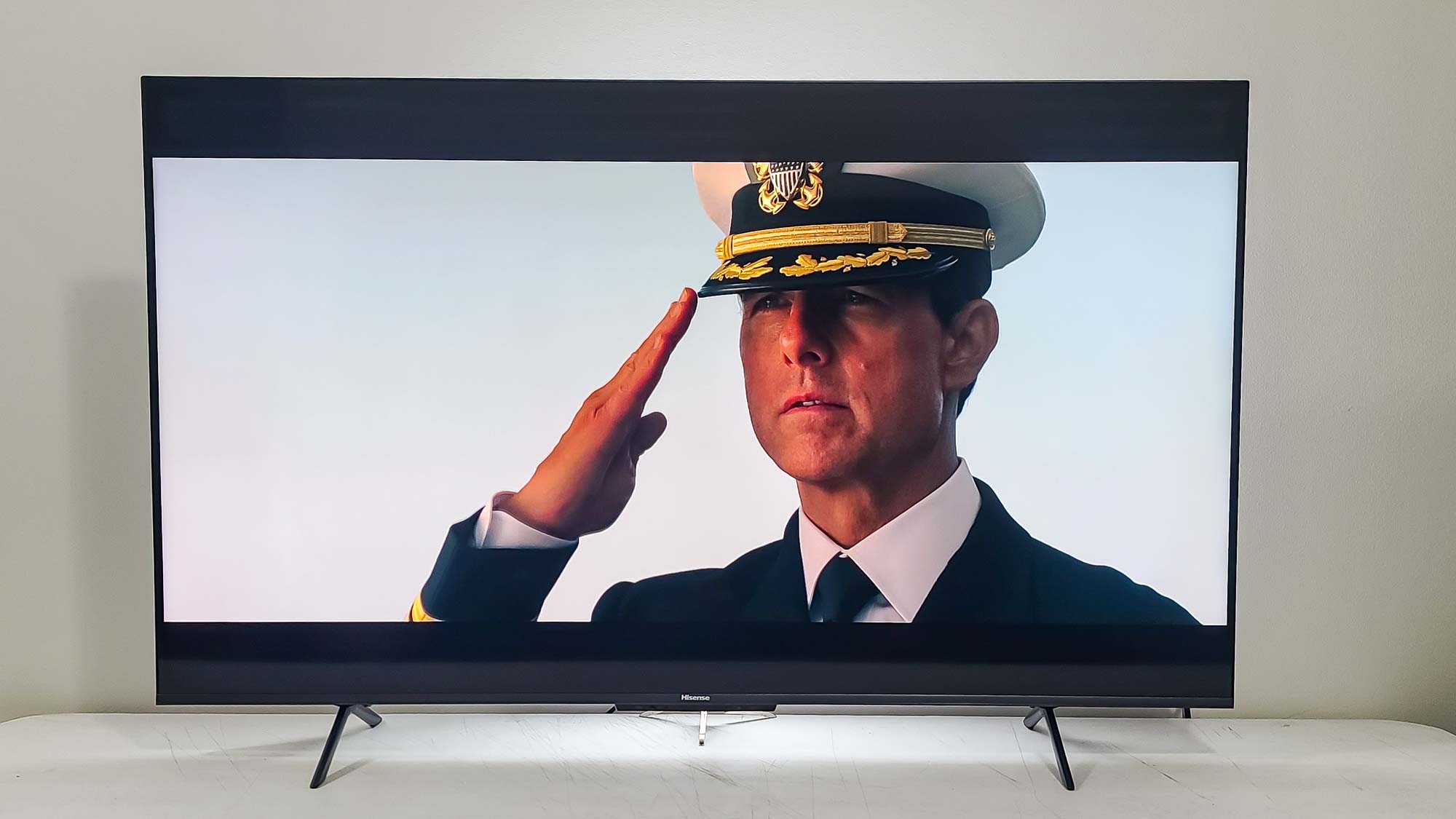
Upscaled from 1080p to the U6H’s native 4K, Mission: Impossible—Fallout looked okay, though there was a touch of smudginess visible in places where we’d expect (and want) to see more fine detail. Off-angle viewing isn’t a total joy, either, as the picture loses some vibrancy when you get too far past the corners, but it remains watchable even then.
Hisense U6H TV review: Test Results
We supplement our visual evaluations of TVs with technical tests conducted using an X-Rite i1 Pro spectrophotometer, a SpectraCal VideoForge Pro pattern generator, and Portrait Displays’ Calman calibration software.
| Row 0 - Cell 0 | Hisense U6H | Amazon Fire TV Omni | Samsung Q60B | TCL Series-6 Roku TV | Vizio M-Series Quantum |
| SDR Brightness (10%, in nits) | 537 | 433 | 315 | 523 | 121 |
| Delta-E (lower is better) | 2.9942 | 1.9696 | 1.7727 | 4.0367 | 1.85 |
| Rec. 709 Gamut Coverage | 97.07% | 97.46% | 98.81% | 96.59% | 98.4549 |
| HDR Brightness (10%, in nits) | 645 | 523 | 454 | 970 | 428 |
| UHDA-P3 Gamut Coverage | 94.02% | 95.82% | 90.57% | 96.35% | 97.17% |
| Rec. 2020 Gamut Coverage | 69.19% | 73.92% | 67.33% | 76.93% | 81.61% |
The U6H may not get quite as bright as its splashier siblings, the U7H and the Hisense U8H, but for its class, it fares pretty well. Its SDR brightness as measured in Filmmaker Mode (the mode that most closely matches out-of-the-box calibration) lands at 537 nits — decent but not spectacular, but enough to win against competitors such as the Amazon Fire TV Omni, the Samsung Q60B, the TCL Series-6 Roku TV, and the Vizio M-Series Quantum.
But it’s worth mentioning that although the U6H’s HDR brightness gets higher, it doesn’t get that much higher — we saw just over a 100-nit increase, whereas the TCL nearly doubled. If Hisense raised the floor a bit with the U6H, it didn’t do much to also raise the ceiling.
Color performance was just a notch down. The U6H’s 2.9942 Delta-E value, which measures the difference between the color at the video source and as displayed on the screen (with lower numbers being better), was a solid midrange showing, better than the TCL but inferior to the Amazon, the Vizio, or the Samsung.
None of the TVs covered the full Rec. 709 color gamut, but U6H’s 97.07% result put it in roughly the middle of this particular pack. The U6H’s handling of the UHDA-P3 gamut (94.02%) puts it well above the Samsung, but behind both the other three TVs, and the same is true of its 69.19% coverage of the wider Rec. 2020 color gamut (where few TVs, especially in this price range, tend to shine—though the Vizio is the clear favorite here).
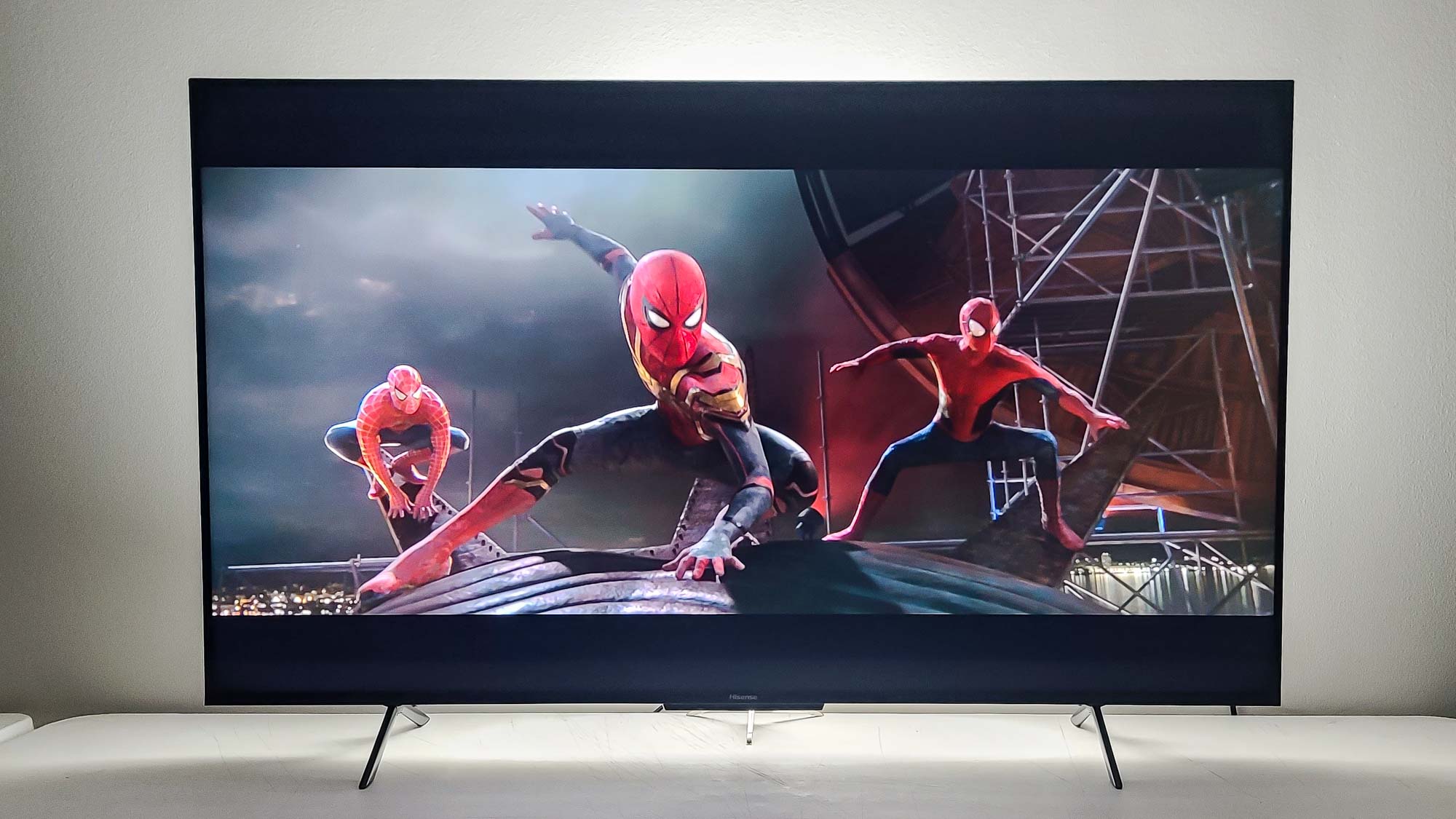
If this means the U6H isn’t as future-proofed as other TVs, it’s met the market squarely where it lives, and won’t disappoint in terms of the content you can watch on it now (and for the next few years).
Hisense U6H TV review: Audio
We don’t expect great sound from cheaper TVs, and the Hisense U6H continues that trend.
I’ll start by saying that my soprano test track could have sounded worse. The climactic high B-flat does sometimes get overly screechy and metallic-sounding on TVs with poor sound systems. And, though the U6H’s is only 20W, it got through that okay — but primarily because the quality level dropped quite a bit before. There was already noticeable distortion and deadness creeping in by volume tick 20, and not getting worse is hardly the same thing as getting better.
Its performance of The Knife’s “Silent Shout” didn’t go as well, however. That’s usually a bass-heavy song that, here, didn’t sound like it. It was flat and uninspiring from the get-go, not so much chill-inspiring as boredom-inducing. And Top Gun: Maverick, which is reliant on the constant overlapping of music, dynamic sound effects, and dialogue was barely an improvement.
Do yourself a favor: If you buy the U6H, spend some of the money you save on the set on one of Tom’s Guide’s best soundbars. It’s an investment your ears will thank you for.
Hisense U6H TV review: Gaming
The good news: As far as input lag, the U6H is an impressive performer. We measured it at 11.2ms with our Leo Bodnar 4K Lag Tester, which puts it in the upper-echelon of current-generation TVs. At that speed it’s well below our 20ms threshold for good gaming performance, if not the 10ms barrier that represents a truly special set in that area. (Samsung and LG manage that routinely; everyone else, not so much.) Nonetheless, you won’t have to worry much about sluggish controls while gaming on the U6H.
Unfortunately, the lack of 120Hz HDMI ports means you won’t get the super-fast refresh rates you want for serious action-oriented titles from your PS5 or Xbox Series X; you’ll have to settle for 60Hz. The U6H does support a lower-end version of variable refresh rate (VRR), however, which isn’t bad compensation, but still isn’t ideal.
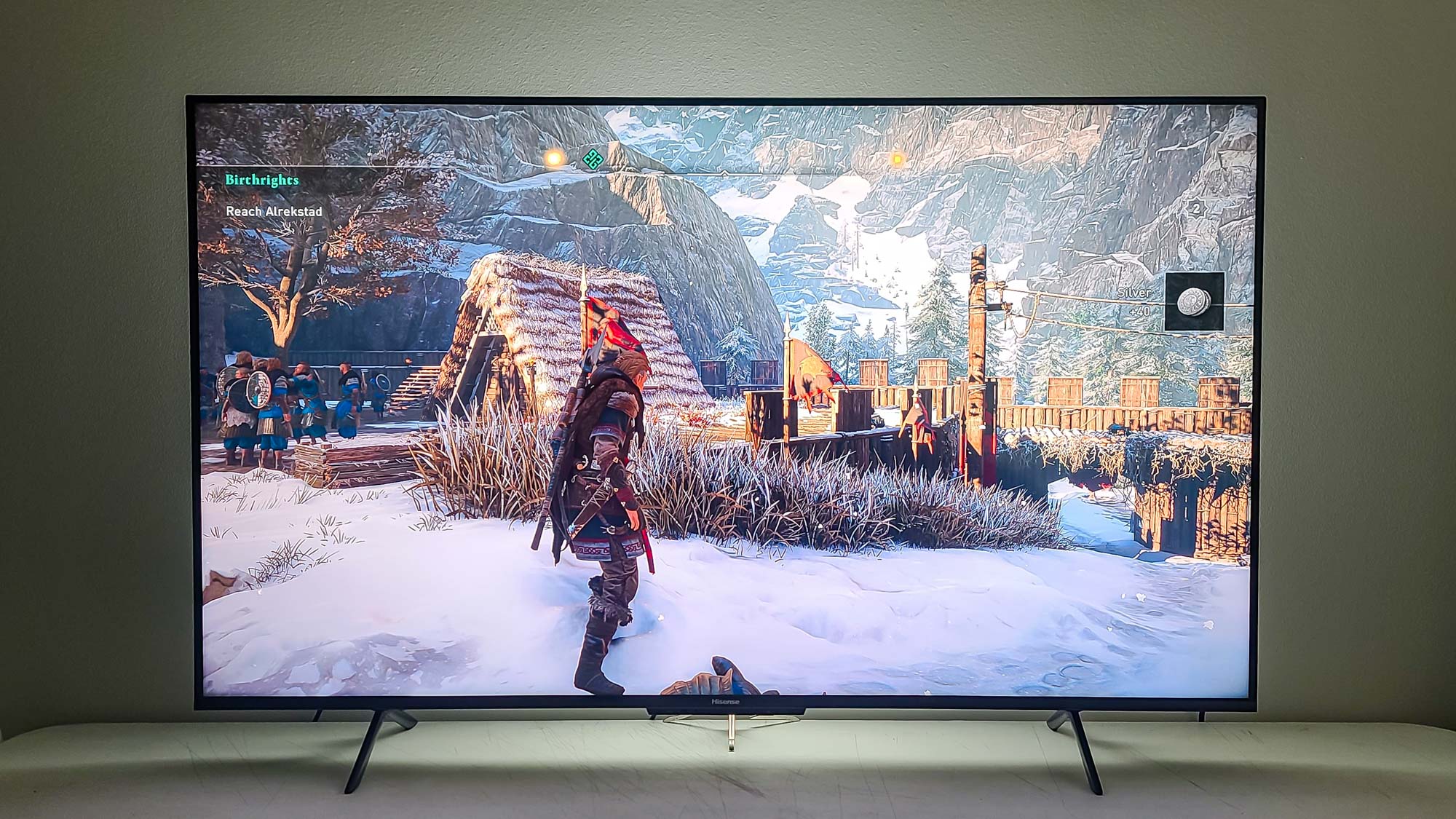
The impediment was evident when playing through the Xbox version of Assassin’s Creed Valhalla, which looked sufficiently rich and colorful (well, within the bounds of its wintry open-world playground), though combat did have a slightly muddy, mushy quality to it. Thankfully, though, this didn’t have a severely negative effect on play.
Hisense U6H TV review: Smart TV interface
Google TV is one of the most powerful smart TV interfaces out there, and the U6H is all the better for its inclusion. Its home screen design cleanly organizes not just your big-picture choices via the top navigation bar (where the options are (Search, For you, Live, Movie, Shows, Apps, and Library), but also your personalized picks, apps, and in-progress videos below that.
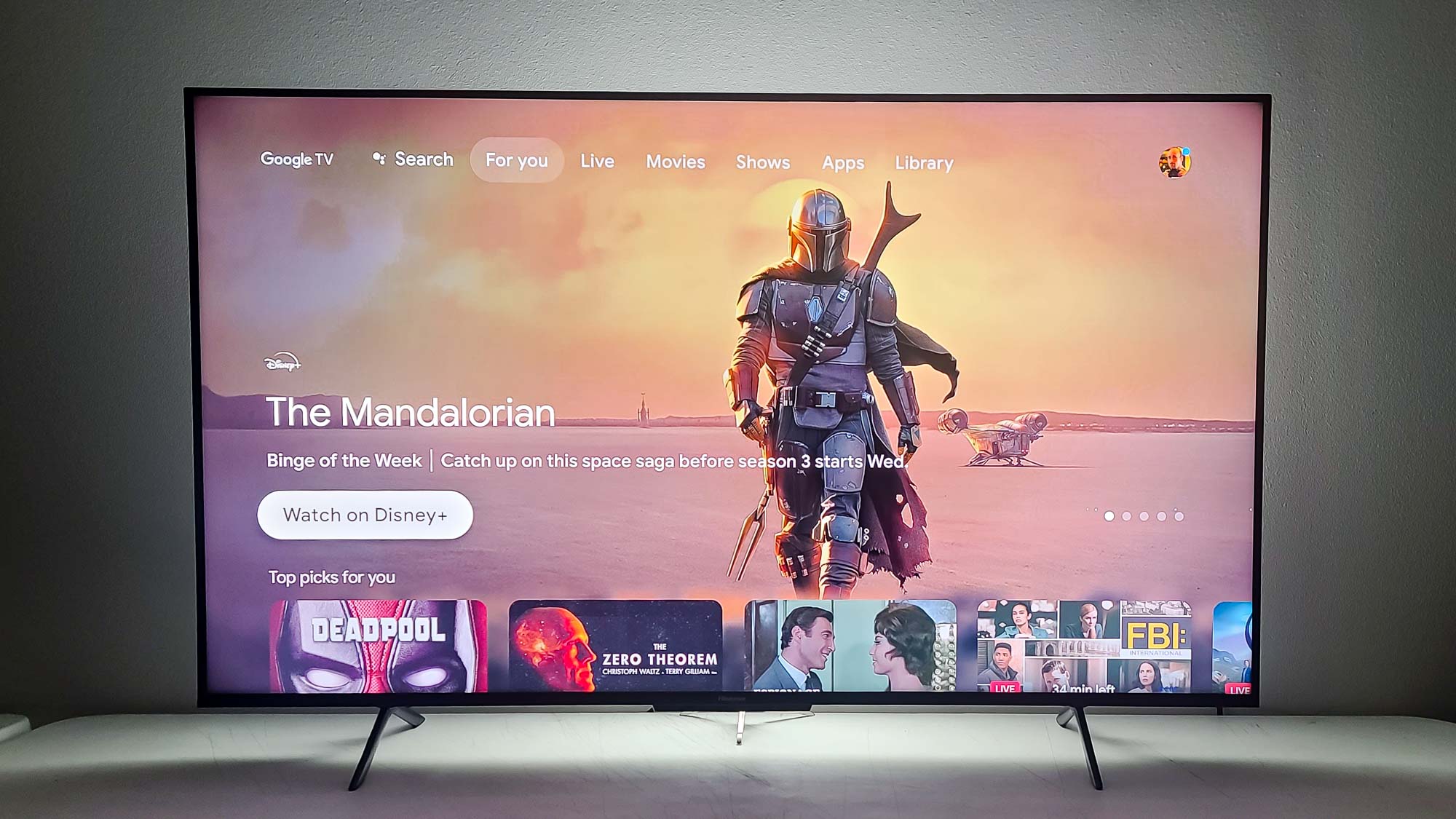
As usual, the curated selections below that are on the forgettable side, but chances are you’ll never need to scroll that far down. At least for me, Google TV’s top-level selections are quite good, and I’m able to locate plenty of things to watch with a minimum of effort. And just about anything else I may be looking for comes in seconds via the Search function, whether text on screen or by the remote’s voice control. And as the software ties in to your Google Account, it can also draw upon your searches from other devices — allowing you to play content from a mobile device thanks to support for Apple AirPlay and Google Chromecast.
Hisense U6H TV review: Remote
The Hisense U6H remote is a simple, no-nonsense unit that, with its bold black-and-white color scheme looks a bit toylike, but provides all the functionality you need.
From top to bottom, the buttons are Power, Input, Google Assistant, Account (for switching to a different Google profile), Settings, a five-way directional pad, Back, TV, Home, Volume and Channel controls, Mute, Menu, Play/Pause, and Numbers and Colors. Below the final row is a collection of six dedicated shortcut buttons for accessing various streaming services: Netflix, Amazon Prime Video, YouTube, Disney+, Tubi, and Peacock.
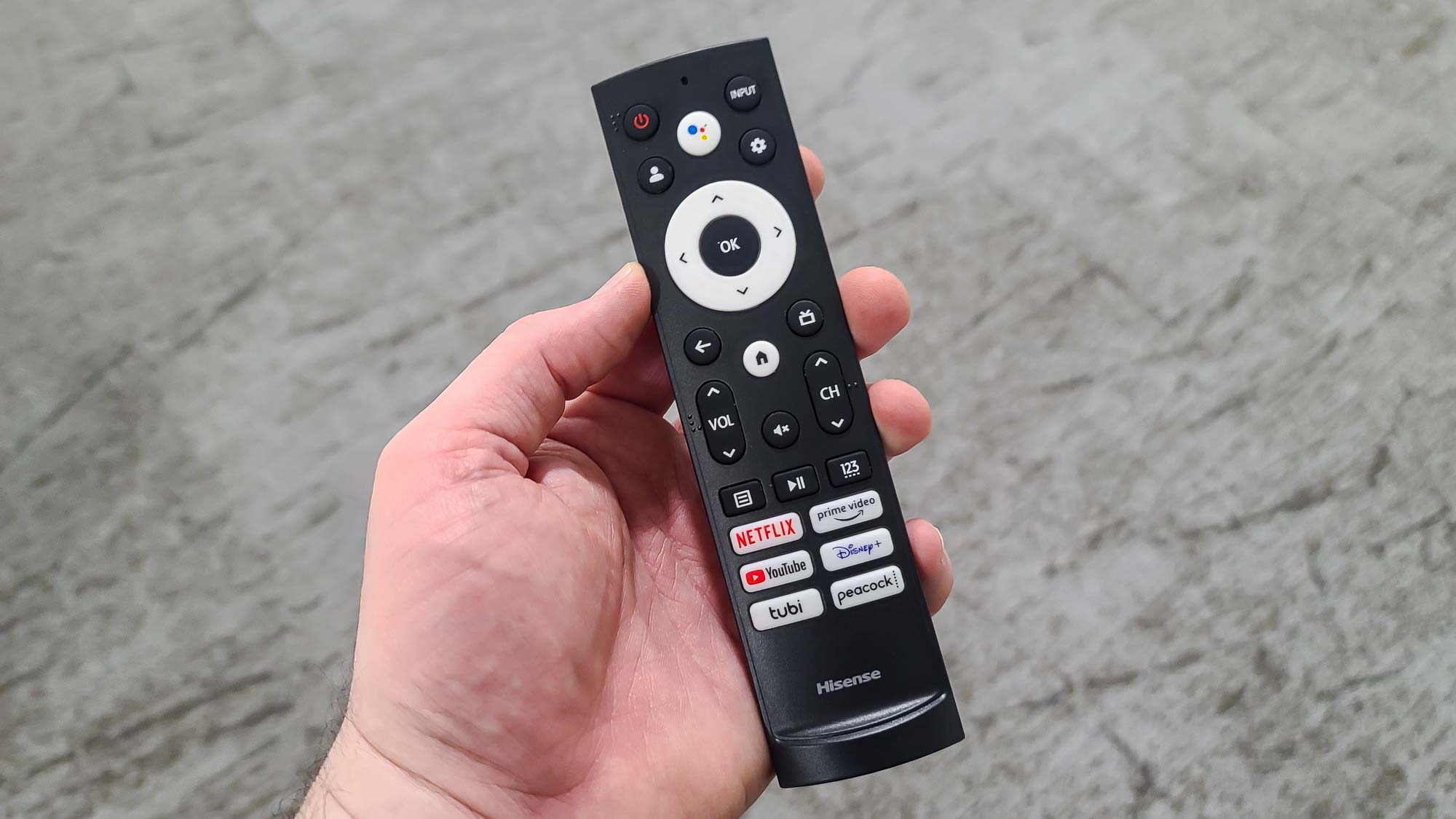
These buttons, Home, the circular directional pad, and Google Assistant are all in white, so they stand out attractively against the solid black of everything else. Speaking of standing: If you don’t want to lay the 6.6-inch-long remote down flat, its flared bottom lets you prop it up vertically. This clever bit of design may make it harder to misplace your remote — something I am all in favor of.
Hisense U6H TV review: Verdict
On the present landscape of budget TVs, the Hisense U6H stands alone. Costing less than most of its direct competitors, and matching or bettering them in several key areas, it’s an irresistible value proposition if you need a TV but don’t have a ton of money to spend on one.
The Hisense U6H might be faced with some stiff competition from the likes of the Amazon Fire TV Omni, the Samsung Q60B, the TCL Series-6 Roku TV and the Vizio M-Series Quantum, but in the end it’s able to deliver a result that exceeded our expectations.
Are you likely to be thoroughly wowed by what the Hisense U6H can do? Probably not. But a TV that combines this level of quality with this level of affordability doesn’t come around every day. So, the U6H is well worth your time and attention.
Matthew Murray is the head of testing for Future, coordinating and conducting product testing at Tom’s Guide and other Future publications. He has previously covered technology and performance arts for multiple publications, edited numerous books, and worked as a theatre critic for more than 16 years.
